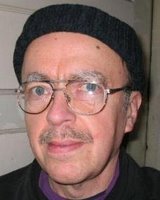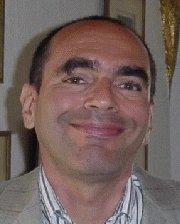 by Jolanda Dubbeldam
by Jolanda Dubbeldam

I push open the front door, dragging a swoosh of cold air in with me.
“I’m home!”
I walk towards the living room, breathing in the smell of fresh coffee and vanilla candles. Warmth envelopes me as I peel off my coat, damp with late fall drizzle - thank goodness we fixed that heater before temperatures dropped to these goosebump levels. My parents are sitting where I left them. My mother in the middle of the sofa with plenty of elbow room for her knitting. Row by row a small sweater grows beneath her hands, alternating bands of green, orange and brown wool, a sweater for an anonymous Afghani child who may be a little less chilly this winter, may feel a little more hopeful. My father sits across from her in the light armchair that seems too snug for his tall frame. I guess he adjusted the floor lamp to shine directly overhead onto the book he is reading, compensating for diminishing eyesight; he is bathed in light. He peers over his reading glasses as I enter the room.
“So, how did it go? What was the lesson about?"
“No lesson tonight, some of us got together and spent a couple of quiet hours working in the library.”
“Ah, not a class then. Like a workgroup. How many of you were there?”
“Just the four of us.”
“What are you working on?"
My father, always the talker. That thirst for conversation, though questions are often just a precursor for the role he really revels in, that of orator. A one-man discussion of information, opinions, presentation of pros and cons - second speaker not required. My father the talker likes to do his thinking out loud.
“Dad, do you remember when I asked you and mom to write down your experiences as children during the war?"
My father has forgotten. I suppose that makes sense, even though his childhood in the Netherlands during the Nazi occupation is a subject he often returns to, its weight heavy on his memory and the shape it gave to his life. A few years ago it occurred to me that these stories might one day be lost to the family forever if someone did not record them. So I asked my parents and in-laws to write down what they remembered of those times. I described my somewhat unspecific vision of processing their memories into an accessible, comprehensive story. Not looking so much for the history of it, but for the emotions, the childhood human experience.
What I got was a different kind of thing. The two omas were initially unsure what to write about, feeling their memories were perhaps too small, not riveting enough. Untrue, of course. Daily life, fears very relatable, anecdotes that opened a window to those days. My mother described a world of small houses, stern Catholicism, fear of omnipresent soldiers, yet at the same time remembered herself skipping through much of it, being just a little girl. Then the opas. I was familiar with parts of my father’s story, yet he too lifted up the veil just a little higher to show more intimate aspects of his youth. He steered clear of emotion, though. Descriptions of the facts were enough. Some things even he cannot express, it seems. My husband's father, the academic, the college professor, also stayed true to his character. He submitted a thesis-like document, full of technical background information about the war, bombs, and precisely which neighborhoods were demolished. He is an introvert, this opa. He is not a talker.
Initially I felt somewhat at a loss, having expected something else, until I realized that they were simply responding to my request: a description of events as each had experienced them, in whatever form they chose. Write about what was most important to you, I said. It doesn't matter how. Do what feels right. And so they did.
Now that I had the stories, I did not know what to do with them - how to do them justice. They were written in Dutch, and I thought to translate them to English, making them more accessible to our increasingly global extended family. Also because English is the language I write in. But should I translate them as they were, and so preserve each individual voice? Or should I translate the essence of them into a single, more flowing story, cutting out repetition and ambiguity? How could I best meld these diverse testaments into a unity of some sort? I was intimidated by the responsibility of it. Finally, I put it aside, and in time, forgot about it.
Now something about having my parents here in my living room has triggered my memory, and I resolve to blow the dust off the project, and finally find a way to move forward.
My mother does remember.
“Ja, opa, a few years ago she asked us and we wrote about the war and we sent it to America in an email.”
“Well, it is always better to do these things with talking," my father turns to me. "You should have an interview, and prepare questions, and then record everything on one of those little tape machines. Did I tell you about that time I was interviewed for a book about my old friend Karel, the one who became quite a famous writer?"
My father tells me. Perhaps he is right about the interview. But the fact that my parents will be returning home to the Netherlands in two weeks while I stay indefinitely in my new home across the ocean makes this an untenable approach. I recoil from the prospect of another never-ending project resting in my computer, waiting for the right moment to proceed.
“Today I started working on your stories. I am translating them, and afterwards we can work together on any blanks that turn up until the stories are complete. We will keep them for the family.”
It is a start. And I am, at heart, a writer, not a talker.
Read More...
Summary only...
 by Richard May
by Richard May














